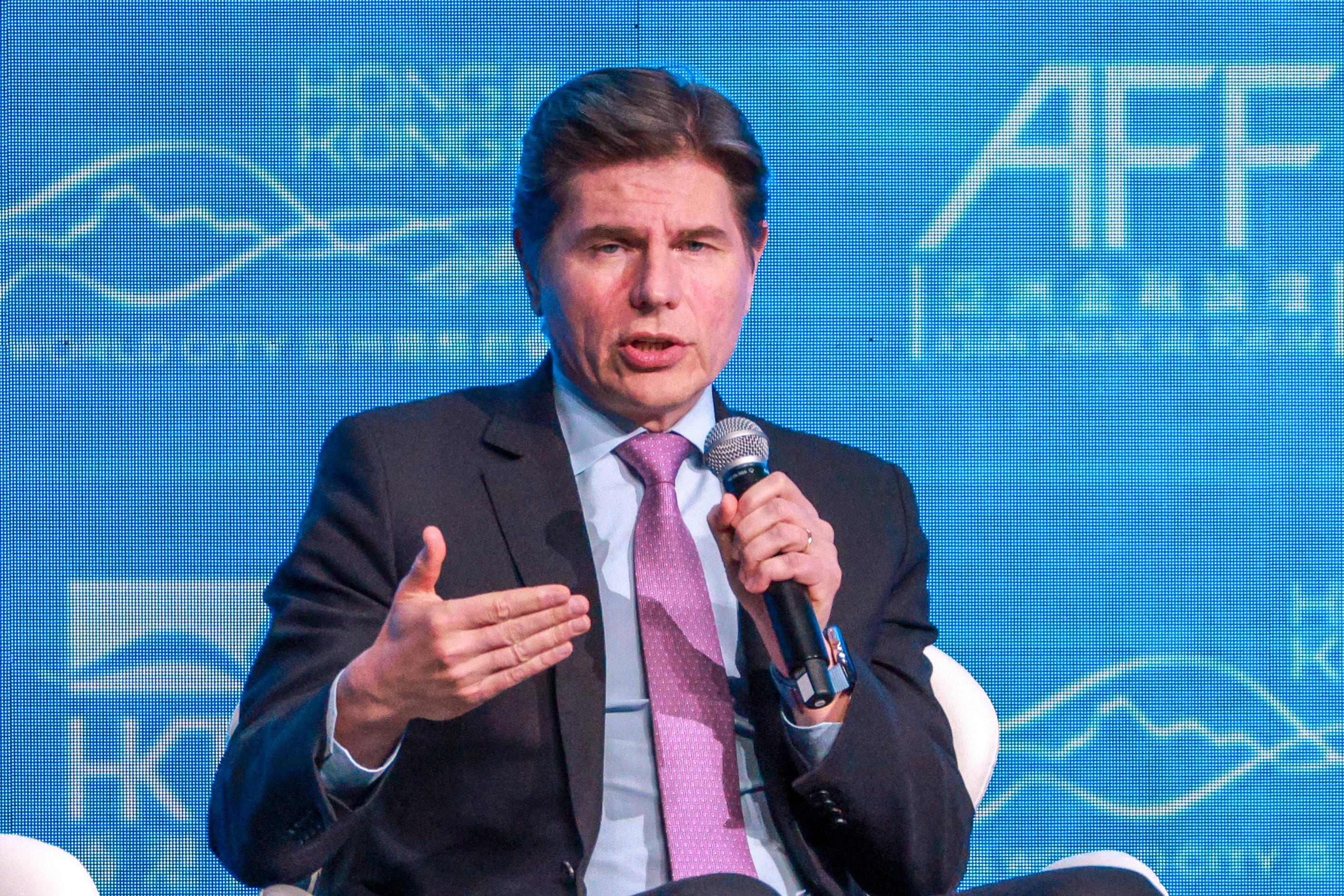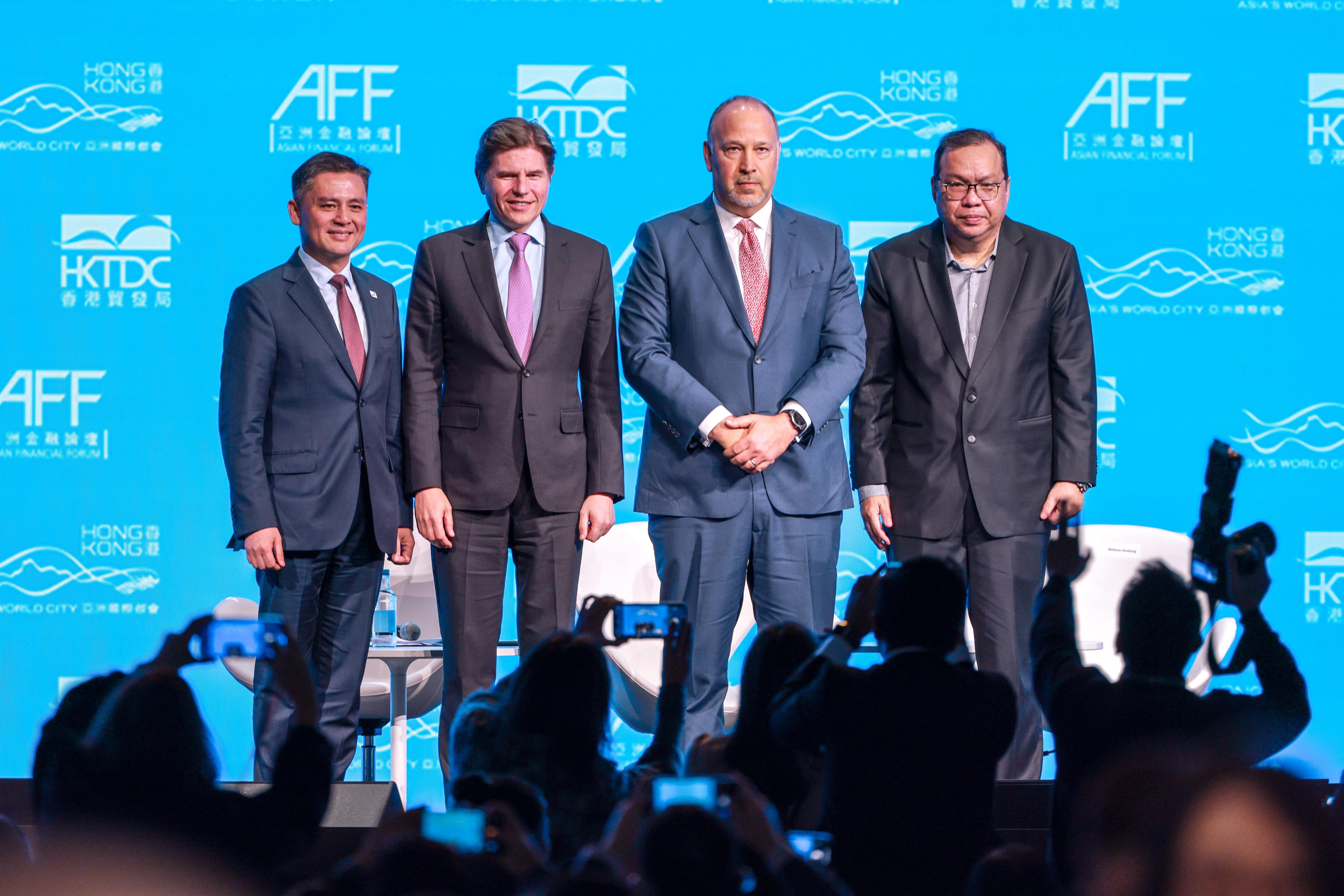 Hong Kong Exchanges and Clearing CEO Nicolas Aguzin speaks during a session titled "Global Spectrum – Capital Markets Outlook" at the Asian Financial Forum in Hong Kong on Jan 25, 2024. (ANDY CHONG / CHINA DAILY)
Hong Kong Exchanges and Clearing CEO Nicolas Aguzin speaks during a session titled "Global Spectrum – Capital Markets Outlook" at the Asian Financial Forum in Hong Kong on Jan 25, 2024. (ANDY CHONG / CHINA DAILY)
Global financial heavyweights cast a vote of confidence on a 2024 rebound in global investments to China, saying that the current situation is “massively underinvested” relative to the country’s economic output.
They shared the insights at the “Global Spectrum — Capital Markets Outlook” session on Thursday during the two-day Asian Financial Forum held in Hong Kong.
Nicolas Aguzin, CEO of Hong Kong Exchanges and Clearing Ltd, said international investment in China remains disproportionately low relative to its economic output, which accounts for nearly 20 percent of the world economy.
Nicolas Aguzin also highlighted Hong Kong’s role as a super-connector, facilitating investment both to and from the mainland
“The amount of investments made by international investors are like 2 or 3 percent, which is massively underinvested, so that at some point has to shift,” he said.
READ MORE: Collaboration key to growth, experts tell forum in HK
Despite China’s slower economic growth with its GDP standing at 5.2 percent last year, its contribution to the world’s economic growth accounts for 30 percent, and a 4-5 percent growth is expected for 2024, which will be pivotal for global economic expansion, he said.
Aguzin believes that more capital from different regions, including the Middle East, will flow into the country this year.
He noted that rising interest rates in the United States, and inflation expectations coupled with geopolitical tensions will affect Hong Kong’s capital market, prompting investors to take a cautious attitude, but he still struck an upbeat note on the market’s long-term stability and growth, saying geopolitical issues and the trend of capital flowing from the stock market to the monetary market will eventually reverse.
 (From left) PwC China Managing Partner, Markets Thomas Leung; Hong Kong Exchanges and Clearing CEO Nicolas Aguzin; HSBC Global Co-Head, Investment Banking Matthew Ginsburg, and President Director of the Indonesia Stock Exchange Iman Rachman pose for a group photo during a session titled "Global Spectrum – Capital Markets Outlook" at the Asian Financial Forum in Hong Kong on Jan 25, 2024. (ANDY CHONG / CHINA DAILY)
(From left) PwC China Managing Partner, Markets Thomas Leung; Hong Kong Exchanges and Clearing CEO Nicolas Aguzin; HSBC Global Co-Head, Investment Banking Matthew Ginsburg, and President Director of the Indonesia Stock Exchange Iman Rachman pose for a group photo during a session titled "Global Spectrum – Capital Markets Outlook" at the Asian Financial Forum in Hong Kong on Jan 25, 2024. (ANDY CHONG / CHINA DAILY)
Matthew Ginsburg, global co-head of investment banking at HSBC, said Hong Kong’s connection to Chinese mainland capital makes it a more attractive market for issuers from across Asia and Europe
“We are in the middle of the cycle. … getting closer to the bottom of the cycle,” Aguzin said.
READ MORE: AFF: HK, mainland to bolster financial regulatory cooperation
The financial veteran also highlighted Hong Kong’s role as a super-connector, facilitating investment both to and from the mainland. “The city is recognized as a key player in the new economy market and seeks to connect and provide opportunities for emerging firms,” he added.
Hong Kong stocks jumped 1.96 percent to finish at 16211.96 points on Thursday after the People’s Bank of China, the country’s central bank, announced it planned to cut the reserve requirement ratio — the amount of liquidity that banks are required to hold as reserves — for banks by 50 basis points from Feb 5 in an effort to boost the economy.
Matthew Ginsburg, global co-head of investment banking at HSBC, said Hong Kong’s connection to Chinese mainland capital makes it a more attractive market for issuers from across Asia and Europe.
READ MORE: AFF panellists highlight rule change for sustainable growth
Approximately 30 percent of stocks on the Hong Kong exchange have renminbi counters — which allow offshore investors to trade equities in renminbi — particularly for the top 24 companies, which is seen as a major attraction for international issuers considering listings due to increased access to mainland capital, Ginsburg said.
Together with economic growth, stability, and support from the Chinese government, which is always critical, “2024 could be a better year”, he predicted.
Iman Rachman, president director of Indonesia Stock Exchange, said foreign investors account for 35 percent of the country’s stock market and the exchange is seeking greater participation of investors from the Hong Kong Special Administrative Region and Thailand.
ALSO READ: Financial policy to focus on real economy
He mentioned that the mainland’s recent investments in Indonesia, such as high-speed rail projects, are expected to benefit regional investors.
Indonesia Stock Exchange saw a record 79 new listings last year. Rachman forecast that the country’s presidential election this year will benefit its stock market, with initial public offerings remaining at a high level.


